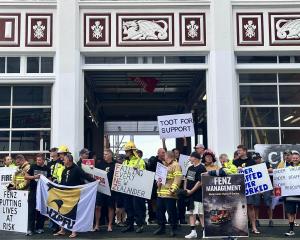
Science is coming to South Dunedin in July, meaning local residents will find the 2018 New Zealand International Science Festival right on their doorstep.
The South Dunedin Community Pop-Up Hub will host dozens of events during the July 6-15 festival, ranging from a virtual reality series, to a travelling marine centre complete with ‘‘touch tanks’’.
Festival director Dan Hendra said it would be ‘‘bigger than ever’’, with more than 220 events scheduled across the city.
‘‘And for the first time, we have worked closely with the South Dunedin community to develop a programme of free events specifically for them.’’
The smooth operation of the programme is in the hands of South Dunedin programme co-ordinator Jule Barth, who is excited to share the programme with locals.
‘‘We are aiming to make science as fun, accessible and relevant as possible to people of all ages — it’s going to be great,’’ Ms Barth said.
‘‘We want to bring science to the community in a totally hands-on way.
‘‘We have three main focuses for our South Dunedin programme — our physical and natural environment; how we grow our food; and how we think about our cities into the future,’’ she said.
In partnership with the Sir Peter Blake Trust and National Geographic, the science festival will feature the New Zealand launch of virtual reality experience ‘‘Our Remarkable Ocean’’.
It will give people the chance to experience the marine environment around New Zealand, and show the contrast between pristine and polluted ocean environments.
The South Dunedin programme will also give locals access to experts in a range of fields, from science to engineering, through a ‘‘speed dating’’ style event.
The science festival organisers have also been working with Otago University on showcasing its 3-D augmented reality ‘‘sand box’’, which allows users to imagine and create a broad range of landscapes.
Mr Hendra said the festival would also be working closely with Otago Museum to present an extensive programme, including Planetarium performances by musician Anthonie Tonnon, and talks and workshops byworldrenowned astrophotographer Mark Gee and local photographers Clive Copeland and Rod Morris.
In addition, Dunedin’s Beverley Begg Observatory would be opening every night of the festival for stargazing, and in particular observing Jupiter and Saturn.













